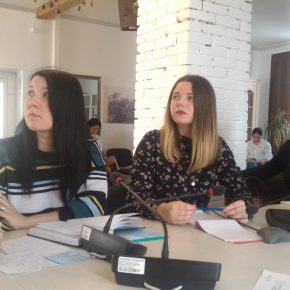Convey emotions and eloquence of the source text!
 On February, 20 the Caspian Higher School of Interpreting and Translation held a virtual class with Directorate General for Interpretation and Conferences of the European Parliament. Alice Rickmans, an interpreter of the French Interpretation Service at United Nations Headquarter in New York, also took part in the class, as this format of classes with our students was of great interest to her, especially because Russian is among her working languages. Second-year master students were the most active participants of the class. Rufina Izmailova and Karina Askhabova delivered interpretation of an English speech into Russian on noise pollution from trains. The German speech about the role of cats in human culture was consecutively interpreted by Madina Kudabayeva. Our speaker, a trainer of the Caspian Higher School of Interpreting and Translation, Uliana Savelieva delivered a speech titled “10 competences we will badly need in 2020”. Alina Budaeva and Ekaterina Natkhina interpreted it into the English language.
On February, 20 the Caspian Higher School of Interpreting and Translation held a virtual class with Directorate General for Interpretation and Conferences of the European Parliament. Alice Rickmans, an interpreter of the French Interpretation Service at United Nations Headquarter in New York, also took part in the class, as this format of classes with our students was of great interest to her, especially because Russian is among her working languages. Second-year master students were the most active participants of the class. Rufina Izmailova and Karina Askhabova delivered interpretation of an English speech into Russian on noise pollution from trains. The German speech about the role of cats in human culture was consecutively interpreted by Madina Kudabayeva. Our speaker, a trainer of the Caspian Higher School of Interpreting and Translation, Uliana Savelieva delivered a speech titled “10 competences we will badly need in 2020”. Alina Budaeva and Ekaterina Natkhina interpreted it into the English language.
It should be noted, that virtual class was quite a success – interpretations given by the master students were positively assessed by our European colleagues. Among the weaknesses the experts noted lacking emotional and figurative component of the source text (especially humour) and considerable difference in length of the speech and its interpretation.
Nevertheless, there are more reasons to be proud of. Our colleagues from the European Parliament were glad to notice appropriate choice of the equivalents and pleasant presentation of the text. They admitted smoothness and fluency of speech, competent and proper gesticulation.
Not only interpretation of our master students was discussed during the virtual class. So, one of the speakers suddenly showed some interest in the students’ B and C languages, especially Chinese and Kazakh, and asked to share their impressions regarding those languages and difficulties, emerging while working with them.
For sure, some pieces of advice were given: the representatives of the Directorate General shared useful interpreting techniques, for instance, explained that interpreting humour requires eye contact. They particularly emphasized the importance of emotions and text eloquence, as they define if the speaker’s message is conveyed properly.





